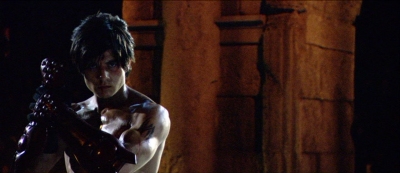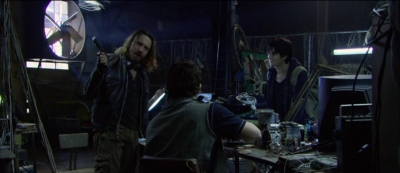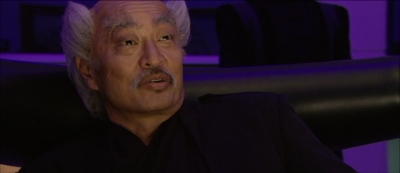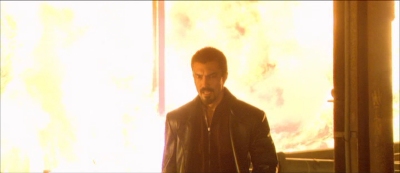
I’m not sure quite how I feel about this frame. On one hand, I’m glad there are some direct references to the game, on the other hand it feels superficial (not to mention artificial).
![Lateef Crowder [left] and Darrin Dewitt Henson [right] as Eddy Gordo (Tekken 3) and Raven (Tekken 5). tekken_01](tekken/tekken_01.jpg)
It’s kind of weird watching a movie based on a video game that draws borderline rip-off inspiration from other movies. Take Raven (right) for example who is based on Wesley Snipes in Blade

I get that the movie can’t be 100% fight sequences, but that doesn’t mean Tekken has to waste our time with irrelevent crap sprinkled with overused movie clichés.
Review by Jay Wilson Once upon a time when I was young and naïve, I was a fan of fighting games, and I often dreamed of seeing my favorite fighters translated to the big screen. As I’ve grown and matured over the years, I’m still very much a fan of fighting games; however, I now realize fighting games are generally incompatible with cinema. The core of a game such as Tekken is the one-on-one competitive aspect. There are no succession of levels to explore bringing the protagonist closer and closer to the end boss, there’s a rudimentary (read: flimsy) premise that’s supposed to pass as a story, and the characters’ personalities are defined by their five-second long victory poses (and, to be fair, also their 10 second ending.) Fighting games have characters. Lots of characters—Tekken has had over 20 characters for years. And each character has a set of moves. You pick your character, your opponent picks his, and thereafter it’s contest to see who can use their character’s tools better. Movies, being a passive medium, lack the interactivity that make fighting games engaging. In an interactive fighting game, a large cast of characters is generally beneficial as it provides more options for the player and play time is limited only by a player’s level of dedication; in a passive movie, it’s a disaster waiting to happen because movies have a set running time to spend on them. In a sprite or polygon-based video game, bright and colorful graphics are appealing; in a live action movie, more often than not it looks silly (see accompanying stills). In a video game, it’s easier to get away with a laughable recycled story and still remain a legend other games aspire towards (CastleVania, Megaman, Street Fighter); in movies, you pull that crap, and you’re Friday the 13th—a laughing stock with a delusional juvenile cult following. It also doesn’t help that by the time Hollywood gets around to making a movie, there are several games with more characters, more plot twists, and Hollywood loves to explain, explain, explain, zzzz. But let’s get away from generalities and into the details of Tekken. The film takes place in a futuristic Blade Runner derivative dystopia which I do not object to on the grounds that it’s different from the games, but I do object to on the grounds that it’s an unnecessary change and really doesn’t add anything except another layer of explanation that could go to developing something, you know, relevant to the games? But, whatever. In a nutshell: in the future governments fall, corporations take over, and North America is controlled by the “Tekken” corporation (in the games, the big corporation in question is called Mishima Zaibatsu which implies it’s in Japan and it does not own/control North America ... but whatever.) ![Anton Kasabov [left] and Gary Daniels [right] as Sergei Dragunov (Tekken 5:DR) and Bryan Fury (Tekken 3). tekken_05](tekken/tekken_05.jpg)
Soul Calibur just called. It wants to remind you that it is the weapons based fighting game, and Tekken is (mostly) hand-to-hand combat.
![Candice Hillebrand [left] and Marian Zapico [right] as Nina and Anna Williams (Tekken 1) tekken_06a](tekken/tekken_06a.jpg)
I probably should have shown a shot of Christie Monteiro (Kelly Overton), but I felt bad that they stuck Anna Williams in as a glorified backdrop.
John Foo stars as Jin Kazama who hears encouragement from his associates that he should participate in the King of the Iron Fist tournament, but his mother, Jun Kazama, warns him not to have anything to do with Tekken. Armed guards called “Jack Hammers” (called “Tekken Force” in the game, and “Jack”, himself, is a giant misproportioned robot ... but whatever), they come looking for Jin, find his mother, and promptly kill her (in the game, she’s actually killed by—oh never mind). Enraged, Jin goes off to fight Marshall Law to qualify for the tournament proper and picks up an agent: the retired fighter, Steve Fox which is really interesting because in the games Fox is a Tekken fighter, he’s about the same age as Jin, oh and he’s not retired. But, whatever. Anyway, the rest of the movie is about Jin’s rise through the tournament, usually with him on the brink of defeat where we flash to an overstylized memory sequence of his training where his mom gives him frighteningly specific advice to defeat this specific adversary, and he goes on to win that match in a last second upset. Between battles, Jin will participate in a few pointless and unfulfilling side adventures with fellow tournament participants while finding out about his mother’s past ties with the tournament, and ultimately Jin will learn the truth and avenge his mother’s death. And you know what? I’ll forgive the setting change. I’ll forgive them renaming Mishima Zaibatsu. I’ll even forgive them dropping the Ogre storyline attached to Jun Kazama’s exit from the series. It’s an adaption. I get it. For the sake of generosity, I’ll even forgive them (stupidly) trying to incorporate not one, not two, not three, but six—yes six—games worth of development into a single ninety-two minute movie. 
If Shang Tsung here can’t make the Heihachi hairstyle work, no one can.
![Gary Ray Stearns [right] as Yoshimitsu. tekken_07](tekken/tekken_07.jpg)
Okay, okay, okay—fine! Yoshimitsu has always had a sword. But that’s it! Well ... him and Kunimitsu. You know what? Forget it.
But I can’t forgive reworking Tekken’s iconic Heihachi Mishima, who hosts the King of the Iron Fist tournament in both the film and the game. In the movie, Heihachi (played by the ever charismatic and badass Cary-Hiroyuki Tagawa) comes across as a powerful honor bound business man obsessed with preserving the Mishima name and the prestige that the Tekken tournament represents. But in the games, Heihachi is a ruthless power hungry son of a bitch. How ruthless is this bastard in the games? Before the first game, Heihachi threw his son, Kazyua, down a well as a test. At the end of Tekken 1, Kazuya returns the favor and throws Heihachi off a cliff so at the end of Tekken 2 Heihachi comes back and throws Kazuya into a volcano. By Tekken 5, Heihachi is blasting his father, his son, and his grandson into space on a rocket. I don’t expect the movie to go to that extreme, but Jesus Christ, this guy’s middle name is “don’t fuck with me.” And if Heihachi is ruthless, his son, Kazuya, is evil. And when I say evil, I don’t mean that in the metaphorical sense. I mean, literal horns, wings, glowing red eyes—“I’ll swallow your soul” Evil Dead II evil. In more than one game, there’s a secret “devil” version of Kazuya. Juxtaposed to Kazuya, Heihachi “I will destroy you” Mishima comes across as a benevolent upstanding guy. Again, I don’t expect the movie to go quite to the extreme the game does, but in the movie, Kazuya is a whiny insecure security guard. Really? I just ... no. At the risk of sounding nit-picky, consider this mind-blowing enigma: in the games Christie Monteiro replaces Eddy Gordo, using the same fighting style (capoeira). Their storylines are also tied together. Now, why put both characters into the movie, and then rewrite Christie entirely? If you’re afraid of overlap, why not pick a completely unrelated character to put in the movie? The Tekken series has in the neighborhood of fifty characters. Instead of Christie, they could have put Asuka Kazama, Ling Xiaoyu, Michelle Chang, or Julia Chang to name a few. Instead of Eddy, they could have put Paul Phoenix, King, Baek Doo San, Hwoarang, Wang, Ganryu, Lee Chaolan, or Lei Wulong. I mean, there are six games—six games—to pick completely different characters from. Why pick two similar characters, and then bastardize one (technically, both were bastardized, but ... whatever.) 
If the man mugging for the camera as he performs the cliché “backdropped by an explosion” walk doesn’t break the forth wall, him talking directly to the audience will.
There’s an annoying saying that goes “well, it’s good for what it is” which implies the product is subpar, but if you lower the scale and expectations suddenly a subpar movie jumps to the top of the list. It’s actually an insult, to be perfectly truthful, implying that a certain genre or certain type of movie is inherently inferior and cannot produce anything comparable to the great movies out there. The depressing thing about Tekken is that even when you lower the scale to “based on a video game” (which is, itself, lower than “mindless summer action popcorn blockbuster”) ... Tekken still isn’t anything special. It is, however, “THE GREATEST THING EVER” on the Uwe Boll scale, but ... never mind. | ||||||||||||||||||||
|
| ||||||||||||||||||||
